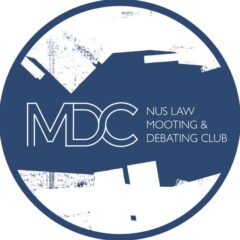The Cape Town Convention Moot 2023: NUS Soars to Greater Heights in Aviation Law
16 November 2023
On 7 November 2023, Team NUS faced off against our Malaysian counterparts in the Cape Town Convention Moot Singapore-Malaysia Joint Finals. We are happy to announce that the team comprising Brendan Wang Guo Jun, Ernest Chua Jie Yu, and Tan Lyn Shann, Rachel, finished runners-up out of 33 teams.
However, their journey to success was not an overnight one. MDC first reached out to the team at the Singapore Semi-Finals on 26 October. The team represented the lessees against a promising team of first-year students armed with thorough and highly convincing research. In the given scenario, the lessees had defaulted payment for rent on the aircraft. In the contract, a ‘high or hell water’ clause existed which imposed an unconditional obligation on the lessees to pay rent, failure of which, constitutes a termination. This allows the lessors to seek various remedies like repossession of the aircraft, and getting an IDERA. As Ernest explained:
“The obligations imposed on our clients were extremely strict and if we were unable to win for our clients, there would be a real risk of them becoming insolvent. There were many late nights where we were figuring out what arguments we could run because the Cape Town Convention is structured in a way which protects the lessors more. The issue was whether or not a foreign order can be enforced in the courts of where the debtor company (lessee) is registered in, and whether the CTC compels it to grant relief pending final determination.”
The complexity of the Cape Town Convention was mirrored in subsequent rounds. After emerging victorious in both the Singapore semi-finals and grand finals, the team was dealt the ultimate test: to deliver their best argument under Indonesian law, characterised by a civil law tradition, distinct from Singapore’s common law jurisdiction. In this context reliance on the written laws and codes Indonesia had as authority took precedence, deviating from the customary reliance on case law in common law traditionsThere was no shortcut: one could not simply map arguments made in the Singapore finals over into the Indonesian courts.
All three members of the team skilfully adapted new facts into novel legal arguments. It was against a seasoned Malaysian team and intense intellectual scrutiny from the bench that the team displayed their eloquence and determination. Ultimately, the team successfully persuaded the court not to recognise the English Order and to prevent the de-registration of the aircraft, benefitting their clients.
As the judges expressed simply, “It was a close match.”
Thus, although the team was just shy of one more victory, the most lasting ‘win’ is found in the experience they gained through this honourable contest, presenting their arguments before esteemed panellists within the legal profession.
MDC asked the team to share their key takeaways for future mooters to emulate:
“Stay calm and guide the Judges through your argument. They may be sharper, smarter, and far more experienced than you but no one knows your argument better than yourself! Lastly, be respectful to the Judges and the Opposing Counsel, and have fun together!” ~ Brendan
“Speak slowly and take as much time as you need to think when answering questions from the bench, especially if their questions are tricky. Having the bench understand you and be with you on your arguments, and you understanding their questions is important in order to have fruitful engagement with the bench.” ~ Rachel
MDC is certain that their experience will inspire more NUS Law students to tackle moot problems in new areas of law, challenging themselves in the process. In particular, aviation law, being international in nature, tests one’s ability to strike a balance between granting contractual freedom, countries’ sovereignty and certainty for lessors and lessees.
MDC and the team would like to thank Andrew Chan from Allen and Gledhill, Tasdikiah Siregar, and Wira Saputra from Norton Rose Fulbright for taking time out of their busy schedules to help coach them. Once again, congratulations to the team: we wish you all the best in the upcoming finals, and we look forward to your greater success in future moots!
